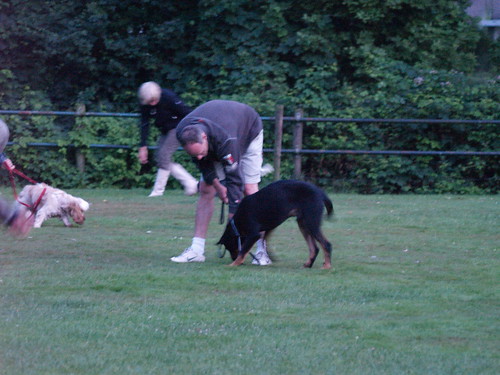Helpful Tips And Techniques To Train Your Dog
February 23rd, 2015 by admin
A lot of people who have pets find that they love them as much as some family members! A puppy is quite a bit of work. Your puppy will need lots of training to become a well trained dog. Take a look at the advice presented above, and you can properly train your dog very quickly.
When doing crate training, train your dog incrementally rather than trying to do it all at once. If your dog seems comfortable inside the crate when the door is open, shut it and feed them a treat. Keep them in the crate for a small duration and slowly increase that duration. If they start to fuss, you are going too fast.
Timing is crucial when you train a dog, so you need to spend an adequate amount of time training them, but not too much. Begin with brief sessions and extend them from there. Pay attention to the point when your dog starts to get restless.
Only reward your dog if they are calm. When the dog correctly follows your commands, you can certainly give a reward. This will help to excite your dog and leave you in complete control. You should stay calm and then give the reward.
Your dog needs to be active frequently. Boredom often befalls an inactive dog, or he may find himself in a “mutt rut” with a dull and listless routine. Not to mention that a bored dog is going to be more stubborn during training. If you have a happy, exercised dog, they will listen better. Get out for some long walks and runs with your dog.
Regulate your dog’s feeding time if you want to regulate his “potty” times too. To keep your puppies toiletry habits regular, feed him a high quality food 2-3 times a day at the same time each day. You can then schedule your walks at the right times to prevent unwanted accidents.
When training, find a verbal clue your pet can understand so they will know exactly when to do as you say. A word like “yes” can be an effective bridge between the time that the dog exhibits the behavior and the time that they receive the reward.
Don’t use any kind of devices, like a shock collar, when training your dog. These devices are expensive and do not always work as well as you would expect them to. In addition, shock collars and some similar items can actually discourage your dog from practicing good behavior. It is common for these tactics to create adverse behavior.
Train your dog to stop barking with a treat. Present the dog with a treat and say the command, stopping only when the dog ceases to bark. Then, you can reward it with a treat. If you repeat this long enough, your dog will associate the treat and then the order with being quiet.
Use your dog’s name all the time, this will help focus him. It is especially important to do this during the first weeks of training, in order to establish that name-attention association. The name should be short and unique, so that he does not confuse it with every day language.
Training Sessions
Do not wear out your new puppy with an excessive training regiment. Brief, simple, positive training sessions are well-suited to the limited supply of energy and attention a pup has to work with. You want to end the session on a positive note; if you push too hard, he will end up dreading your training sessions.
When you are trying to house train a puppy, it is not going to learn overnight, so be prepared. It’s important to immediately clean up the accident to make your training more effective. Animals are inclined to eliminate repeatedly in spots where they can smell urine or feces, and carpets require special care. Your local animal store may have numerous products to help eliminate this.
Take the information in this article to develop a training plan for your puppy. Keep your patience high and your love flowing to a well-behaved dog. It probably won’t happen overnight, but everything you’ve read will certainly take you closer to that point.
Avail the prospect to know far more about our solutions by visiting our
 web site .
web site .
- Comments Off on Helpful Tips And Techniques To Train Your Dog
- Posted in Dog Training

